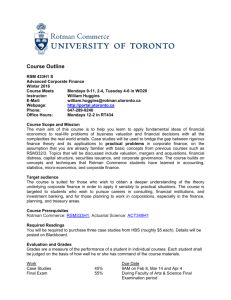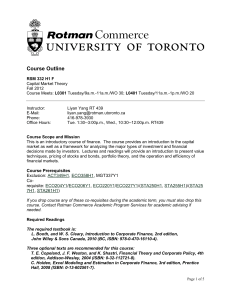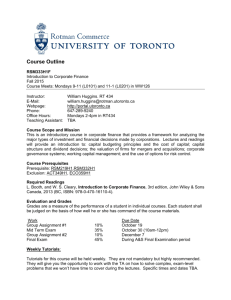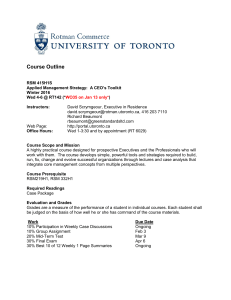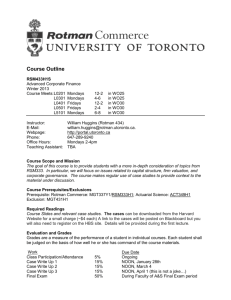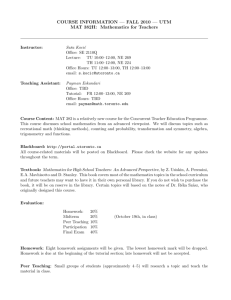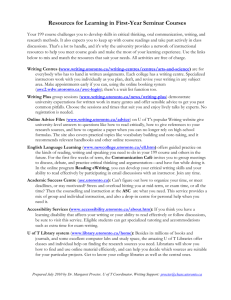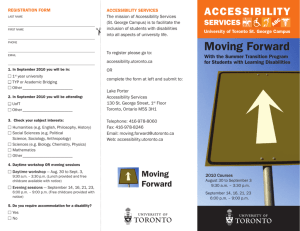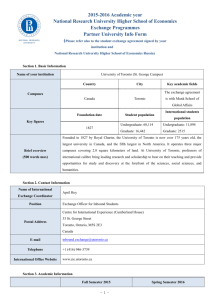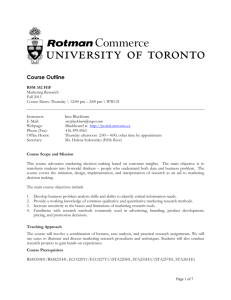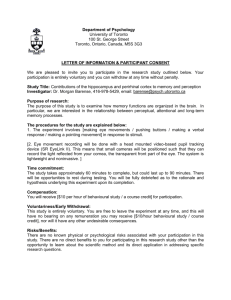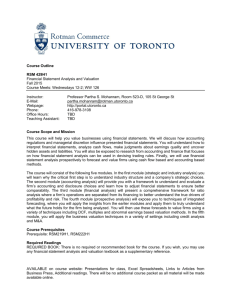July 9, 2015 RSM295Y - Summer Abroad
advertisement
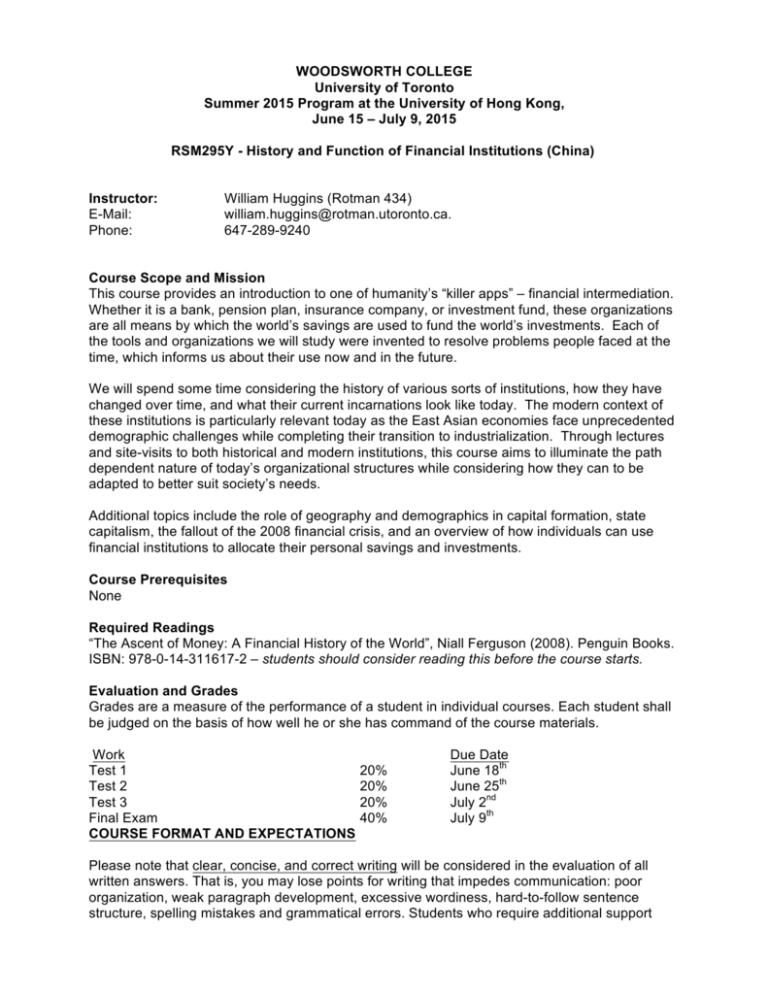
WOODSWORTH COLLEGE University of Toronto Summer 2015 Program at the University of Hong Kong, June 15 – July 9, 2015 RSM295Y - History and Function of Financial Institutions (China) Instructor: E-Mail: Phone: William Huggins (Rotman 434) william.huggins@rotman.utoronto.ca. 647-289-9240 Course Scope and Mission This course provides an introduction to one of humanity’s “killer apps” – financial intermediation. Whether it is a bank, pension plan, insurance company, or investment fund, these organizations are all means by which the world’s savings are used to fund the world’s investments. Each of the tools and organizations we will study were invented to resolve problems people faced at the time, which informs us about their use now and in the future. We will spend some time considering the history of various sorts of institutions, how they have changed over time, and what their current incarnations look like today. The modern context of these institutions is particularly relevant today as the East Asian economies face unprecedented demographic challenges while completing their transition to industrialization. Through lectures and site-visits to both historical and modern institutions, this course aims to illuminate the path dependent nature of today’s organizational structures while considering how they can to be adapted to better suit society’s needs. Additional topics include the role of geography and demographics in capital formation, state capitalism, the fallout of the 2008 financial crisis, and an overview of how individuals can use financial institutions to allocate their personal savings and investments. Course Prerequisites None Required Readings “The Ascent of Money: A Financial History of the World”, Niall Ferguson (2008). Penguin Books. ISBN: 978-0-14-311617-2 – students should consider reading this before the course starts. Evaluation and Grades Grades are a measure of the performance of a student in individual courses. Each student shall be judged on the basis of how well he or she has command of the course materials. Work Test 1 Test 2 Test 3 Final Exam COURSE FORMAT AND EXPECTATIONS 20% 20% 20% 40% Due Date June 18th June 25th July 2nd July 9th Please note that clear, concise, and correct writing will be considered in the evaluation of all written answers. That is, you may lose points for writing that impedes communication: poor organization, weak paragraph development, excessive wordiness, hard-to-follow sentence structure, spelling mistakes and grammatical errors. Students who require additional support and/or tutoring with respect to their writing skills are encouraged to visit the Academic Success Centre (www.asc.utoronto.ca) or one of the College Writing Centres before the course begins (www.writing.utoronto.ca/writing-centres). These centres are teaching facilities where trained staff can assist students in developing their academic writing skills. There is no charge for the instruction and support. Course Schedule Session Date 1 June 15 2 June 16 3 June 17 4 June 18 5 June 22 6 June 23 7 June 24 8 June 25 9 June 29 10 June 30 11 July 1 12 July 2 13 July 6 14 July 7 15 July 8 16 July 9 Topic Money and Debt : barter, fiat currencies, digital money, default, loan forgiveness Banking: history, functions, risks, credit unions, microfinance Central Banking: liquidity support, money supply, inflation, US Fed, ECB, PBOC TEST #1 Government finances: capital formation, the welfare state, sovereign debt, the IMF Modern Financial Crises: Great Depression, S&L crisis, 1997, 2008 2008 and China in transition: slowing growth, pollution, aging society • TEST #2 Corporations: stakeholders, governance, agency problems, state capitalism Stock Markets: functions, market makers, margin, bubbles, high frequency trading Public Investment Vehicles: mutual funds, ETFs, hedge funds TEST #3 Pensions and Endowments: demographics, Norway vs Canada, SWFs Insurance and Derivatives: actuarial science, underwriting, ownership, exchanges Personal Finance: financial planning, building wealth, retirement (not on exam) FINAL EXAM Field trips will occur 1-2 times per week, generally in the afternoon following a lunch break after class. More information will follow as dates are confirmed for our visits. POLICIES AND PROCEDURES Accessibility Needs The University of Toronto is committed to accessibility. If you require accommodations for a disability, or have any accessibility concerns about the course, the classroom or course materials, please contact Accessibility Services as soon as possible: disability.services@utoronto.ca or http://www.accessibility.utoronto.ca/. Academic Integrity Academic Integrity is a fundamental value essential to the pursuit of learning and scholarships at the University of Toronto. Participating honestly, respectively, responsibly, and fairly in this academic community ensures that the UofT degree that you earn will continue to be valued and respected as a true signifier of a student's individual work and academic achievement. As a result, the University treats cases of academic misconduct very seriously. The University of Toronto’s Code of Behaviour on Academic Matters http://www.governingcouncil.utoronto.ca/policies/behaveac.htm outlines the behaviours that constitute academic misconduct, the process for addressing academic offences, and the penalties that may be imposed. You are expected to be familiar with the contents of this document. Potential offences include, but are not limited to: On test and exams: • Using or possessing any unauthorized aid, including a cell phone. • Looking at someone else's answers • Misrepresenting your identity. • Submitting an altered test for re-grading. Misrepresentation: • Falsifying institutional documents or grades. • Falsifying or altering any documentation required by the University, including (but not limited to), medical notes. All suspected cases of academic dishonesty will be investigated by the following procedures outlined in the Code of Behaviour on Academic Matters. If you have any question about what is or is not permitted in the course, please do not hesitate to contact the course instructor. If you have any questions about appropriate research and citation methods, you are expected to seek out additional information from the instructor or other UofT resources such as College Writing Centres or the Academic Success Centre. Email At times, the course instructor may decide to communicate important course information by email. As such, all UofT students are required to have a valid UTmail+ email address. You are responsible for ensuring that your UTmail+ email address is set up AND properly entered on the ROSI system. For more information please visit http://help.ic.utoronto.ca/category/3/utmail.html Forwarding your utoronto.ca email to a Hotmail, Gmail, Yahoo or other type of email account is not advisable. In some cases, messages from utoronto.ca addresses sent to Hotmail, Gmail or Yahoo accounts are filtered as junk mail, which means that important messages from your course instructor may end up in your spam or junk mail folder. Blackboard and the Course Page The online course page for this course is accessed through Blackboard. To access the course page, go to the UofT Portal login at https://portal.utoronto.ca/ and log in using your UTORid and password. Once you have logged in, look for the My Courses module where you’ll find the link to all your course websites. If you don’t see the course listed here but you are properly registered for the course in ROSI, wait 48 hours. If the course does not appear, go to the Information Commons Help Desk in Robarts Library, 1st floor, for help, or explore the Portal Information and Help at www.portalinfo.utoronto.ca/students and review the Frequently Asked Questions. Recording Lectures Lectures and course materials prepared by the instructor are considered by the University to be an instructor’s intellectual property covered by the Canadian Copyright Act. Students wishing to record a lecture or other course material in any way are required to ask the instructor’s explicit permission, and may not do so unless permission is granted (note: students who have been previously granted permission to record lectures as an accommodation for a disability are, of course, excepted). This includes tape recording, filming, photographing PowerPoint slides, Blackboard materials, etc. If permission is granted by the instructor (or via Accessibility Services), it is intended for the individual student’s own study purposes and does not include permission to “publish” them in anyway. It is absolutely forbidden for a student to publish an instructor’s notes to a website or sell them in any other form without formal permission.
